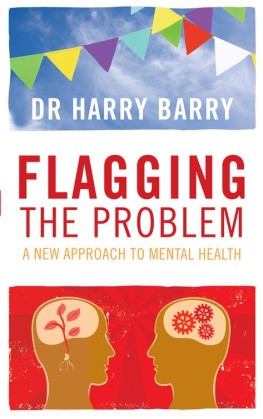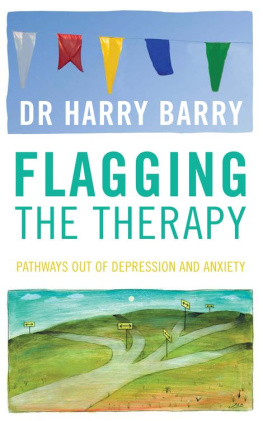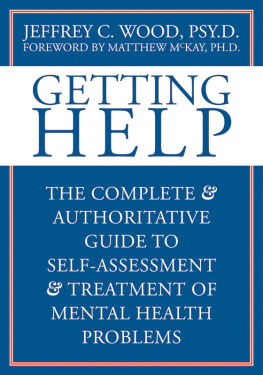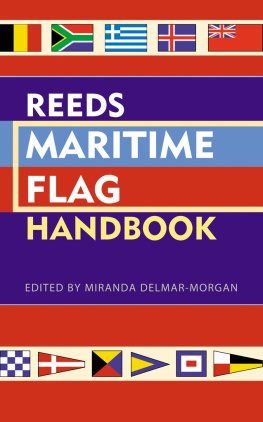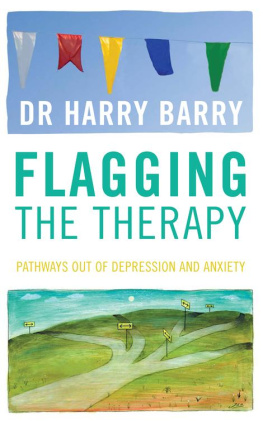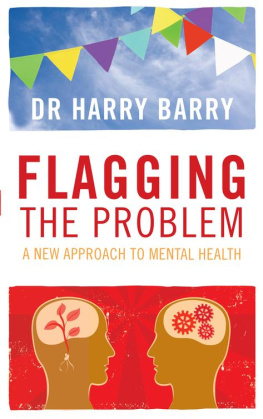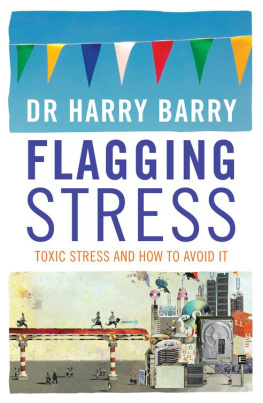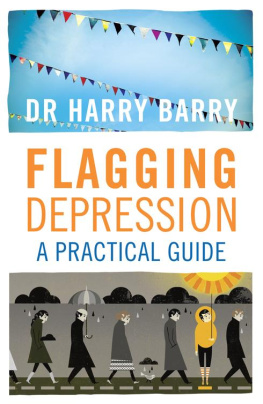Praise for Flagging the Problem
Its that rare thing a medical book that can be read by lay people and health professionals alike. Dr Barry demystifies subjects that touch so many of our lives and he does so with compassion, wisdom and vast professional knowledge.
Cathy Kelly
Dr Harold Barry, in Flagging the Problem, distils impressive amounts of research and practical experience into an accessible and balanced guide to the issues of mental health, depression, addiction, anxiety disorders and suicide. With admirable clarity and compassionate sensitivity, this book offers not just information, but hope, to anyone affected directly or indirectly by these issues.
Breda OBrien
This is a superb book; it looks at mental-health problems in a fresh and accessible way. The use of an innovative flag method to explain mood disorders offers a unique insight into depression. Flagging the Problem could help save lives that might otherwise be lost to suicide.
Dr Muiris Houston, Medical Correspondent, The Irish Times
This is an important book. It provides a new approach to mental health and the intricacy of the variables that influence it. Written with compassion and creativity and informed by decades of General Practice insights, Dr Harry Barry helps the reader to understand the complexity of the normal mood system and the distress of depression, anxiety, addiction and suicide.
Marie Murray, Director of the Student Counselling Services at University College Dublin
Depression is the scourge of the twenty-first century. Dr Barry, in Flagging the Problem, offers a unique insight into this illness from a biological/sociological/cognitive perspective, and in this wonderful book has married together all three insights. In particular he defines the hidden dynamic underlying the reluctance of the sufferer to come for help. This is a must read for public and professionals alike.
Enda Murphy, Cognitive Behaviour Therapist and Project Director, ICGP
Dr Barry has produced an innovative, highly readable, challenging text which focuses on the core mental-health disorders associated with suicide. The book will be of major benefit to doctors working in primary care, clinical psychologists and other professionals in the mental-health arena.
Professor Ted Dinan, MD, PhD, DSc, Department of Psychiatry, University College Cork
This outstanding book will be of tremendous help to those who are trying to understand the complexities of mental illness. By integrating a medical and psychological approach, Dr Barry has bridged a gap that has often pitted those espousing either psychological or pharmacological treatments against each other. The book will be of great assistance to everybody who is striving to end the scourge of suicide.
Professor Patricia Casey
Having read Flagging the Problem, I now have a much better understanding of why Niall died. This book is written in very simple terms, exploring the complex nature of depression and suicidal tendencies. It is a must read for every parent, informing them of the tell-tale warning signs of depression and suicide.
John, father of Niall, who died by suicide in 2002
This book is dedicated to Niall, his parents John and Anne, and all his family and friends. It is also dedicated to Jason, his uncle Michael and all those who have lost loved ones to the white flag of suicide. Niall and Jason, you are not forgotten by those who love you in this world, and we pray you are happy in the next.
Contents
When I approached an old friend of mine, Dr Tony Bates, for advice on how to get this book published, he gave me the following advice: Find an editor who believes in both you and the book. Tonys advice was as always very wise. I have indeed been very fortunate in finding such an editor in Sen OKeeffe of Liberties Press. With patience, kindness and a great eye for detail, he has turned my ramblings into a reality. I owe him a debt I can never repay. To Peter OConnell at Liberties Press I owe a debt for his expertise in the marketing and media side of this book. We are fortunate in Ireland to have such a forward-looking publishing company.
There are so many others who have played a part in this project. To John and Anne, who allowed me to share Nialls story, and to Dr Michael Smurfit for his support and encouragement, and for writing the foreword, I can only say thank you. A special thanks to Kate Kelly for all her help.
To Enda Murphy, the Irish College of General Practice CBT Project Director, I also offer special thanks. He was, and still is, of great assistance in introducing myself and a number of GPs around Ireland into the world of this form of psychotherapy. Many of the clinical and theoretical details about CBT contained in this book were provided by Enda. I hope I have been faithful to his teachings!
To Cathy Kelly, author and UNICEF ambassador, I must offer a special thank you for being of great support and encouragement at a time I needed it most. She is and always will be a real lady.
I would like to send a big thank you to all at Aware, particularly Prof. Patrick McKeown, CEO Geraldine Clare, Annette Byrne, our most able chairman, all the hard-working members of the Board, and the many members around the country, for their support and encouragement. This book is for you all.
To my reviewers, Prof. Patricia Casey, Prof. Ted Dinan, Dr Muiris Houston, Marie Murray, Dr John Connolly (of the Irish Suicidology Association), Mike Watts of GROW, Dr Michael Boland of the ICGP, and Breda O Brien, along with others mentioned already, another warm appreciation.
To my loyal and devoted staff at 5 Leland Place Fiona, Carmel, Susan, Anne and my practice nurse Brenda for all their help and support throughout the period of writing this book. A special thanks also to Darina and Michael for their help with this project.
To my mother Dilly Barry (Thurles) and brothers Gerald and Kevin for their support and encouragement. To my mother-in-law Ciss Lahart (Eyrecourt) for her help and support down through the years, and to all our friends and relatives who have backed this project.
There are a number of people who sadly will not be here to see this published. The first is my brother David (who died recently, following a short illness), and I dedicate this book to him and his family (as well as to Niall and the other people mentioned in the dedication). We will miss you. The second is our great family friend Sister Kieran Saunders MMM. She was by my side during many difficult times in the Developing World and remained close to our little unit over many years till her death. It was she who persuaded me to stay in Ireland rather than return to the Developing World, explaining that there was poverty of a different kind at home. How right she was, for despite our affluence, there are many problems (some of which are dealt with in this book) in modern Ireland. We miss you so much, Kieran, and pray that you will remain our spiritual guide throughout this mysterious journey through life and beyond. We also remember my father Harry and my father- in-law Nicholas, who are sadly not with us to share this moment.
Moving on to my family, I would like to start with my daughter Lara, our media expert, who spent a month editing and putting together my initial data into a presentable document. Her expertise, occasionally challenging observations (Dad, get real!) and support, then and throughout the process of putting the book together will never be forgotten.
I also have to thank my son Daniel, psychology and communications expert, who was my right-hand man throughout this whole project. He was responsible for researching key articles, helping me design and create the diagrams which enrich this book, and also helping with the initial editing. Without his help, this book may never have reached a stage where it could be published.

